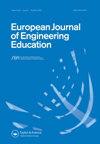在工业界工作一年对高等教育(工程学)学术成果的影响
IF 2.8
Q2 EDUCATION & EDUCATIONAL RESEARCH
引用次数: 0
摘要
摘要行业年计划提供了超越学术环境的新技能或强化技能,为巩固学术技能提供了背景,并为后续研究提供了成熟的方法。目前的工作旨在根据工程专业学生是否在行业中工作一年,量化行业中一年的就业计划对他们学业成绩的影响。结果显示,成绩的提高是显著的:从安置到学士三年级的学生成绩提高了5.7%。方差分析测试表明,观察到的增长不是预期变化的结果。详细的分析回顾了课程中可以表达的好处。分析表明,认为学生从三年级项目中获得的技能中受益的看法基本上是正确的,但混淆了因果关系和相关性。最后,研究表明,在就业之前,低年级类别的学生从行业中受益最大。工程专业的这一年对学生来说无疑是有益的。还有一些工作要做,以确定哪些能力得到了提高,或者收益是个人的还是集体层面的可量化的,并具有普遍的趋势。本文章由计算机程序翻译,如有差异,请以英文原文为准。
The impact of a year in industry on academic outcomes in higher education (engineering)
ABSTRACT Year-in-industry schemes provide new or enhanced skills beyond the academic environment, a context for consolidation for the academic skills and a maturity in the approach to subsequent studies. The present work aims to quantify the impact of the year in industry placement scheme on academic outcomes for engineering students according to whether or not they undertake a year in industry. The results show that the gain in grades is notable: +5.7% for students returning from placement to year 3 of a Bachelor. ANOVA tests show that the increase observed is not the result of expected variation. A detailed analysis reviews where in the curriculum, the benefits may be expressed. The analysis shows that the perception that students benefit from skills gained on the year in industry for their third-year project is mainly correct, but confounds causality and correlation. Finally, it is shown that students in lower grade categories prior to the placement benefit most from the year in industry. The year in industry in engineering is demonstrably beneficial to students. Some work remains to be done to define which competences are improved, or whether the gains are individual or quantifiable at the collective level with generalised trends.
求助全文
通过发布文献求助,成功后即可免费获取论文全文。
去求助
来源期刊

European Journal of Engineering Education
EDUCATION & EDUCATIONAL RESEARCH-
CiteScore
7.30
自引率
13.00%
发文量
64
期刊介绍:
European Journal of Engineering Education is published six times a year in print and electronic editions and provides an essential forum for dialogue between researchers and specialists in the field of engineering education, at European and worldwide levels. European Journal of Engineering Education is the Official Journal of SEFI, the Socièté Européenne pour la Formation des Ingénieurs (the European Society for Engineering Education). SEFI is a non-governmental organization whose aims are to develop information about engineering education, to improve communication and exchange between professors, researchers and students and to promote cooperation between the various institutions concerned with engineering education.
 求助内容:
求助内容: 应助结果提醒方式:
应助结果提醒方式:


